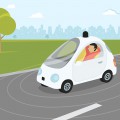 Google and Uber became close friends in 2013 when the venture capital side of the search engine invested more than $250 million in the ride-sharing app.
Google and Uber became close friends in 2013 when the venture capital side of the search engine invested more than $250 million in the ride-sharing app.
Soon after, David Drummond, Google’s senior vice president of corporate development and chief legal officer, became part of Uber’s board of directors.
But, less than two years later, the relationship between the two companies may be on the verge of a change.
Google may be experimenting with a ride-sharing phone app of its own, similar to Uber’s program.
This may be connected to the driverless car that Google has been working on, according to Bloomberg. Neither company is talking publicly but Bloomberg reported that Uber executives may have viewed screenshots of what seems to be a ride-sharing app from being used by Google’s employees.
Similarly, Uber is moving into Google’s turf. The company recently announced plans to develop cars that drive on their own and is teaming up with Carnegie Mellon University on a research facility in Pittsburgh, Pa.
In addition, Uber is adding engineers who are experts on mapping technology and has been in talks with Facebook, Google’s advertising rival, to find ways to work together.
Google has been quite vocal about its desire to revolutionize transportation with autonomous vehicles, recently saying its driverless car technology is two to five years from being ready for widespread use.
At the Detroit auto show in January, a Google executive spoke about people being able to call an autonomous vehicle to take them wherever they want to go.
Should Google get into the ride-sharing market with driverless taxis, it would certainly have a head start over Uber. Despite Uber’s interest in developing autonomous vehicles, it would most likely have to form an alliance with a company pursuing the technology.
Mercedes, Audi, Tesla and other carmakers have said they are developing driverless cars, though none seem to be as advanced as Google’s.
Uber’s CEO has said driverless taxis could offer cheaper rides, making the cost of using Uber cars for transportation less expensive than owning a vehicle.
It’s not unusual for Silicon Valley business partners to become rivals as the companies get bigger, compete for workers and worry about being pushed out.
Look at Microsoft and Apple. Microsoft invested in Apple in the mid 1990s when Apple was struggling but parted ways once Microsoft started working on Android, a direct competitor to the iOS software that runs Apple’s phones and tablets.





